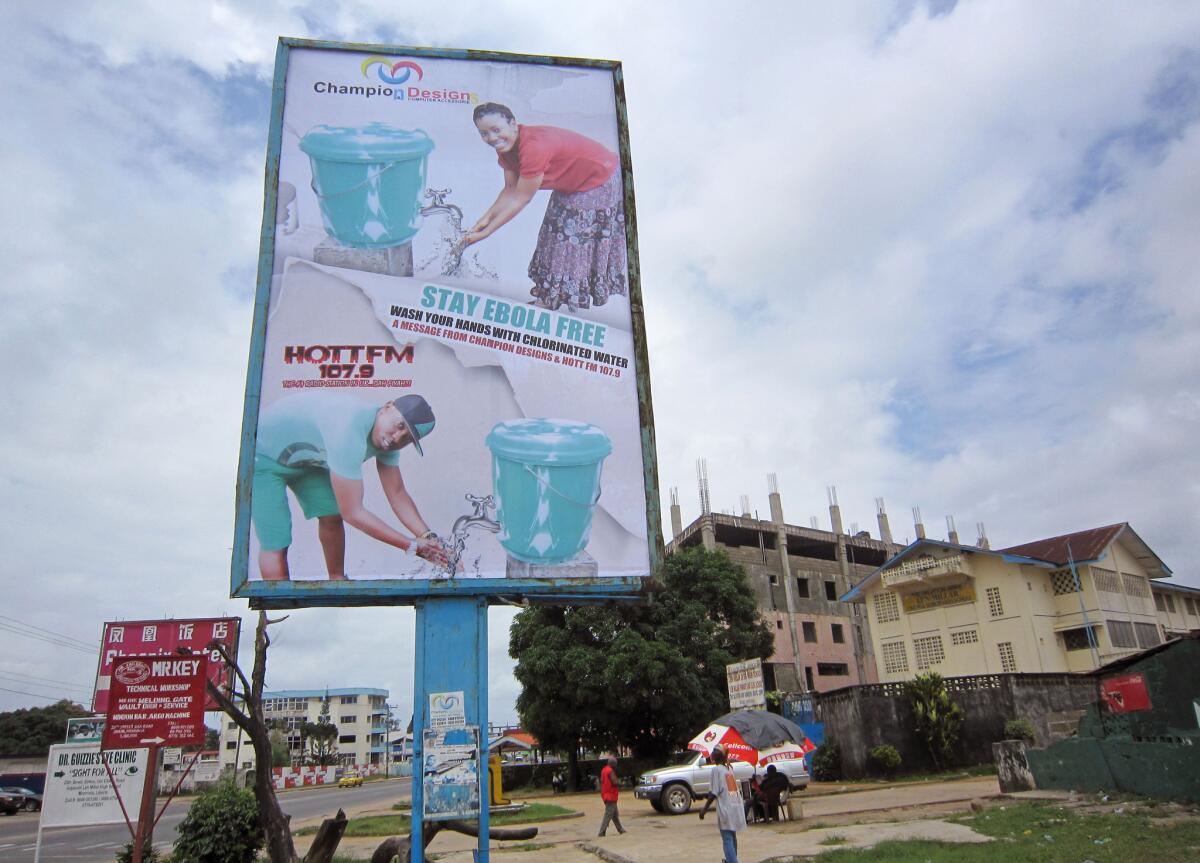WHO explains how a suspected Ebola outbreak spread in Congo

- Share via
A suspected Ebola outbreak in Central Africa has been traced to a pregnant woman who butchered a slain bush animal that had been given to her husband, the World Health Organization said Wednesday.
The Health Ministry in the Democratic Republic of Congo said Sunday that two samples taken from a remote village in the northwestern province of Equateur had tested positive for the deadly virus, but added that the infections were from a different strain than the one that has killed more than 1,400 people in four West African countries.
France, meanwhile, recommended that its nationals leave Liberia and Sierra Leone because of the outbreak there, and the national carrier Air France temporarily suspended flights to Sierra Leone’s capital, Freetown.
United Nations officials have urged airlines and other transport companies not to suspend service to Ebola-affected countries, saying it is hampering efforts to bring in much-needed supplies and humanitarian workers.
Air France will continue to fly to Guinea and Nigeria, saying airport screening procedures in those countries will ensure that people displaying symptoms of Ebola aren’t allowed to board its flights.
In Nigeria, the government postponed the start of the school year until Oct. 13 to help prevent the spread of Ebola, local news reports said.
A total of 24 suspected Ebola cases were identified in Congo between July 28 and Aug. 18, including 13 people who died, the WHO said. Samples have been sent to laboratories in the Congolese capital, Kinshasa, and the nearby nation of Gabon to confirm the presence of Ebola and verify the strain, the United Nations health agency said in a statement.
If confirmed, this would be the seventh Ebola outbreak in Congo since 1976, when the disease was first reported.
There is no cure or vaccine for Ebola, which is spread by contact with infected bodily fluids. The illness can jump from animals to humans through the handling or eating of infected carcasses.
The woman believed to have been the first person infected in the latest outbreak came from Ikanamongo village and died Aug. 11 of a then-unidentified hemorrhagic fever, the statement said. A doctor and two nurses who were exposed to the woman during surgery also developed symptoms and died, along with a hygienist and another person identified as a “ward boy.”
Other deaths were recorded among relatives of the woman, people who were in contact with clinic staff and those who handled the bodies of the victims during funeral ceremonies, the WHO said.
The Health Ministry has sent teams to the affected area to evaluate the situation. Individuals who came in contact with the victims are being traced, the WHO said.
So far, 80 people are being followed. None of them traveled to West Africa or were in contact with people from that region, the WHO said.
The Ebola outbreak in West Africa has taken a heavy toll on health workers. More than 240 have been infected and at least 120 have died in Liberia, Sierra Leone, Guinea and Nigeria, according to WHO figures.
Authorities in Sierra Leone said Wednesday that a leading doctor had succumbed to Ebola. Dr. Sahr Rogers contracted the virus while working at a hospital in the eastern city of Kenema, the Associated Press reported. He was the third doctor in the country to die of Ebola.
A Senegalese epidemiologist, who was infected while deployed for the WHO in the eastern Sierra Leonean town of Kailahun, was flown to Germany overnight and was receiving care Wednesday at a Hamburg hospital. The WHO has temporarily withdrawn its remaining staff members from the town while it investigates how the infection happened.
The U.S. Centers for Disease Control and Prevention said it had flown home via private charter an employee who had “low-risk exposure” to a health worker infected with Ebola in Sierra Leone.
The CDC employee, who was due to return to the United States, had worked in the same room as the infected person. The employee was not displaying any symptoms, the CDC said in a statement. But it is policy that staff members traveling long distances after contact with Ebola patients should use private travel methods during the 21-day incubation period.
The Public Health Agency of Canada announced that it was evacuating a three-member mobile laboratory team from Kailahun after people in their hotel complex were diagnosed with Ebola.
None of the Canadian team members had direct contact with those infected and they were not displaying signs of illness, the agency said in a statement. But they will remain in voluntary isolation and will be monitored during the incubation period, the statement said.
For more international news, follow @alexzavis on Twitter
More to Read
Sign up for Essential California
The most important California stories and recommendations in your inbox every morning.
You may occasionally receive promotional content from the Los Angeles Times.











